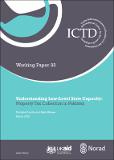Understanding Low-Level State Capacity: Property Tax Collection in Pakistan
Abstract
This paper is based on a detailed analysis of how field staff in the Excise and Taxation Department of the Punjab Provincial Government collect the (very low-yielding) property tax. In general, informal practices and relationships play a major role. More specifically, field staff enjoy considerable discretion in making key decisions about property tax assessment; the additional earnings that they are able to get from colluding with taxpayers are used in part to employ support staff and cover routine operating costs; and field-level staff are deeply rooted in the locality where they work, typically serving in one office for their entire career, and both monopolise and manipulate the information on the tax base and on collection performance that senior management would need to establish effective control of the system. In contrast more senior staff are transferred frequently between postings and have short time horizons in any particular posting, and senior staff have little capacity either to monitor and assess the performance of junior staff or to discipline them. It would, however, be misleading to attribute the poor performance of the property tax system principally to the behaviour of tax collection staff. There is considerable evidence that the low-level equilibrium that we observe stems in large part from the relative lack of interest of various levels of government in property tax revenue, and the priority they give to keeping the levels of government below them dependent or disempowered. There is potential to improve the property tax system, especially through wider use of information technology. Should there be adequate political support for reform outside the Excise and Taxation Department, implementation would be very difficult without taking account of the capacity of field staff to block change, and of the need to negotiate change with them.

